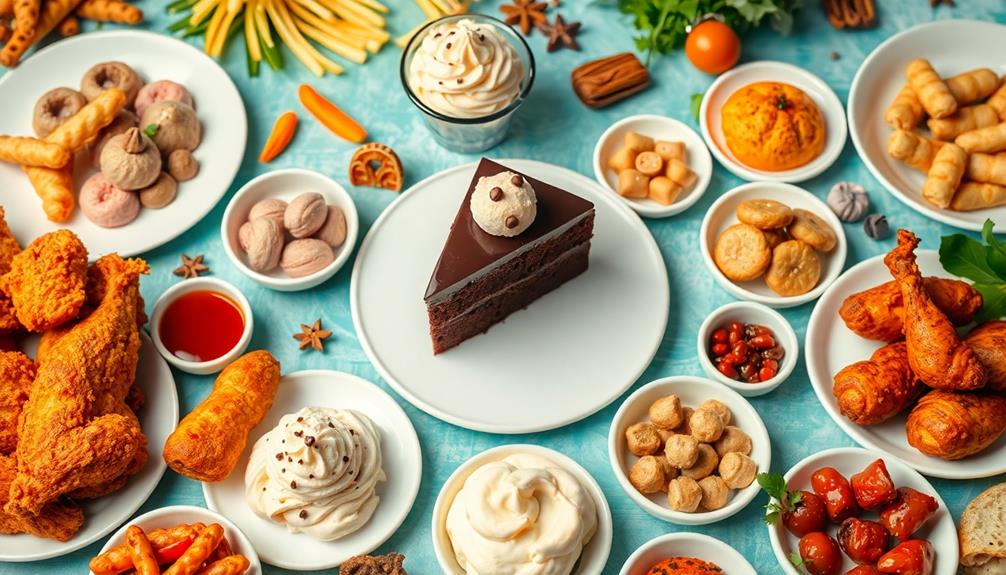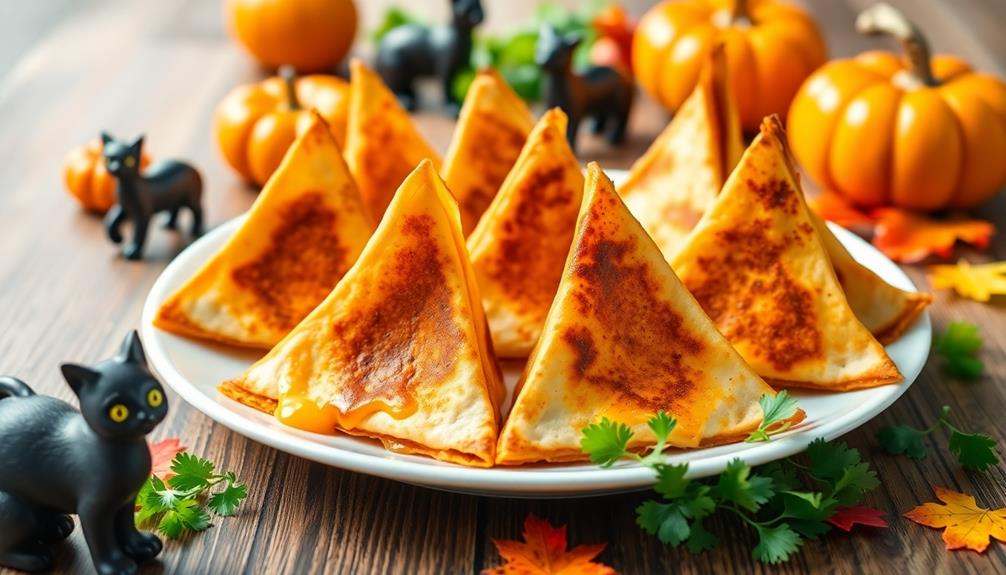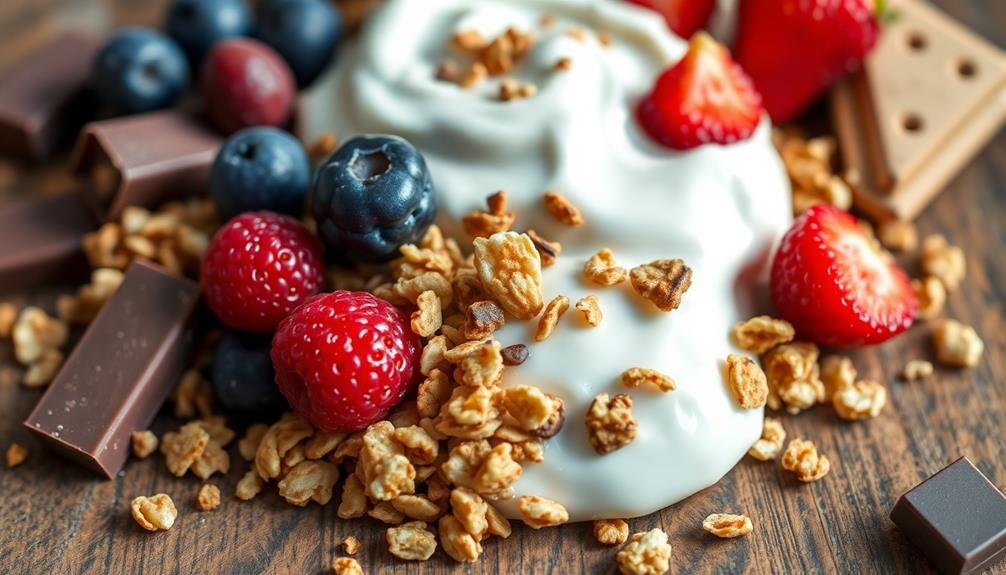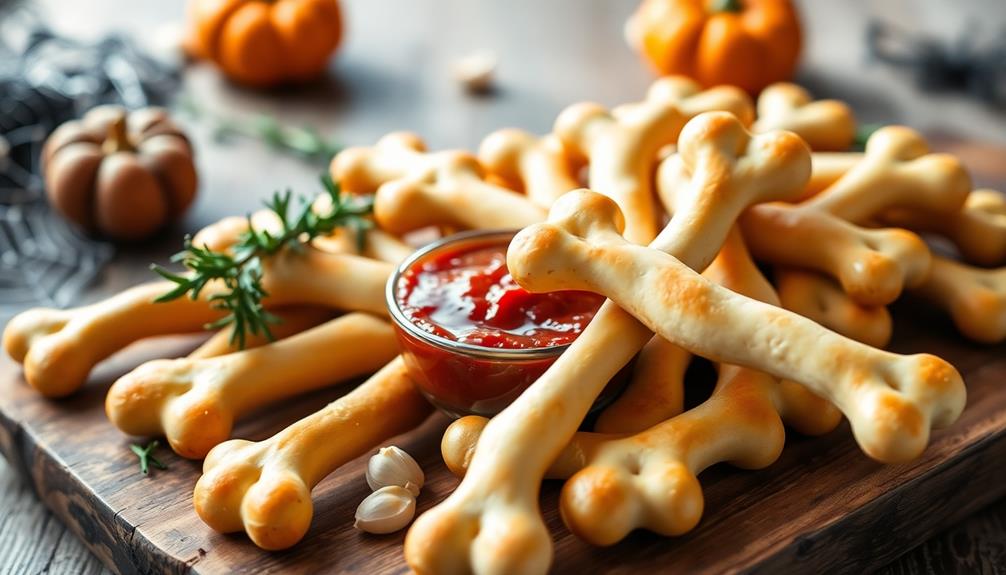Certain foods become "guilty pleasures" across cultures because of historical and societal ties to indulgence. You might feel joy in eating chocolate cake, yet still carry a sense of guilt, rooted in views about morality and excess. This tension often stems from diet culture, which labels indulgence as bad. Foods that evoke cherished memories and emotional connections, like family recipes, can intensify this guilt. However, reconnecting with these treats through mindful eating can shift your perspective. Embracing nuances in food enjoyment might just transform your relationship with what you consider a guilty pleasure. Stick around to explore this further!
Key Takeaways
- Cultural definitions of guilty pleasures stem from historical views on indulgence, often associating certain foods with gluttony and moral failings.
- The rise of diet culture creates guilt around indulgent foods, labeling them as "bad" and fostering feelings of shame when consumed.
- Emotional connections to food, such as nostalgia and shared experiences, contribute to the perception of certain dishes as indulgent yet desirable.
- Celebratory occasions often highlight indulgent foods, reinforcing societal attitudes that frame enjoyment as morally questionable.
- The shift towards mindful eating encourages a neutral perspective on food, reducing the stigma associated with indulgent choices and promoting enjoyment.
Cultural Definitions of Guilty Pleasures
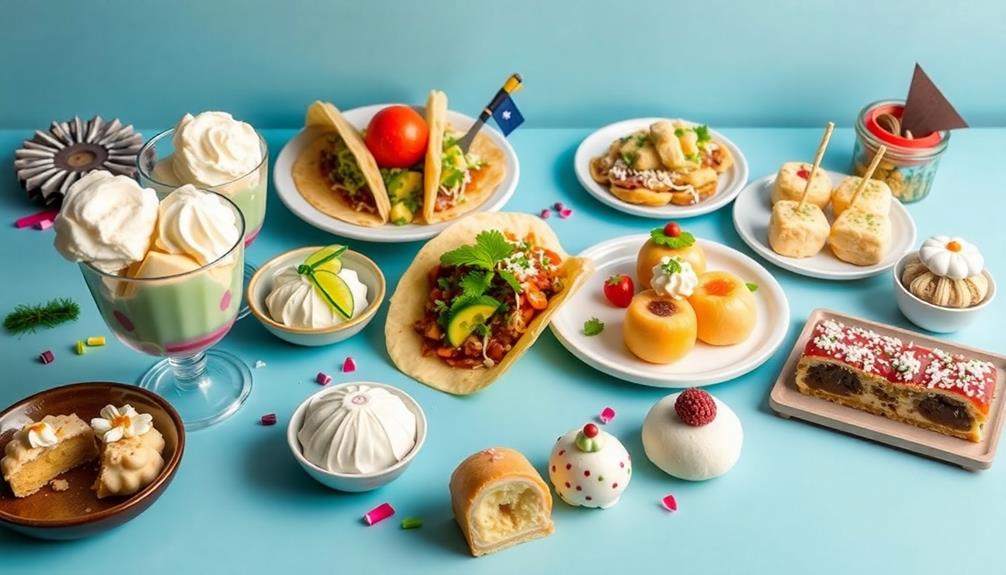
When you think about guilty pleasures, it's intriguing how their definitions shift from culture to culture. The term emerged in the 1860s, initially reflecting societal attitudes toward indulgent or unhealthy foods. Over time, these perceptions evolved, with certain items labeled as "bad," often tied to historical views on gluttony and moral failings.
In the 1920s, changing beauty standards and the rise of industrialization led to sedentary lifestyles, cementing the idea that enjoying specific foods was socially unacceptable. For instance, traditional dishes like chilaquiles may be seen as indulgent, yet they represent the resourcefulness of using leftover ingredients in Mexican cuisine.
Cultural labels like "sinful" and "treats" reinforce this stigma, making you feel guilty when indulging in these foods. However, across various cultures, the definition of guilty pleasures can vary greatly. While some local delicacies are celebrated, globally recognized "unhealthy" foods often carry a negative connotation.
This contrast highlights diverse attitudes toward nutrition and indulgence, illustrating how what's considered a guilty pleasure in one culture may be a cherished part of another's culinary identity.
Ultimately, understanding these cultural definitions can help you navigate your own feelings about guilty pleasures, allowing for a more nuanced appreciation of food and its place in your life.
Emotional Connections to Food
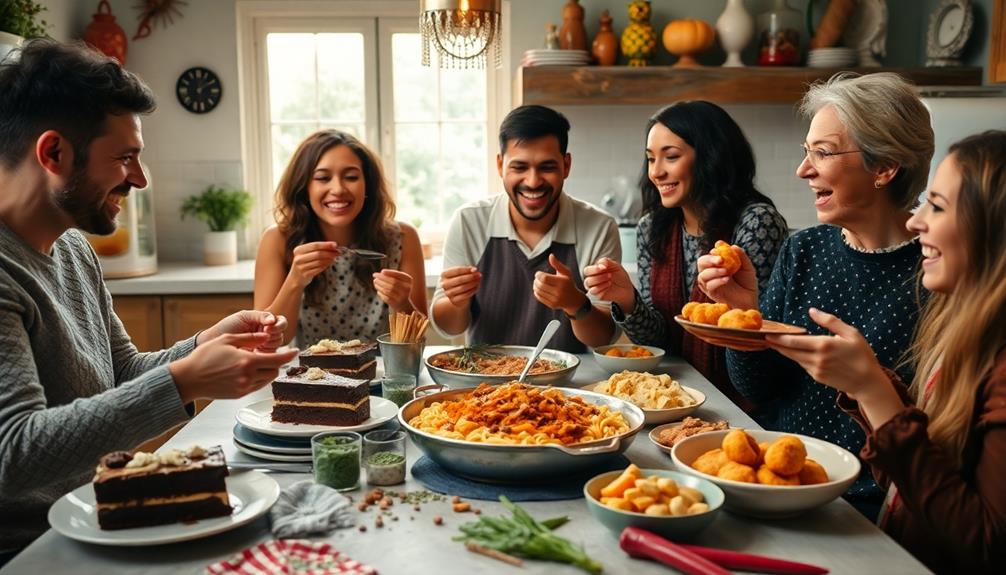
When you think about your favorite comfort foods, nostalgia likely washes over you, bringing back memories of family gatherings and cherished traditions.
These indulgent treats not only satisfy your cravings but also connect you to your cultural roots and personal history.
For example, in Brazilian cuisine, dishes like Caldeirada and Brigadeiro evoke strong emotional ties, celebrating communal experiences and shared flavors.
As you savor each bite, you might find that these foods offer a sense of belonging and a temporary escape from life's pressures.
Nostalgia and Comfort Foods
Nostalgia often stirs deep emotional connections to food, transforming simple meals into cherished memories. When you think of comfort foods, what comes to mind? For many, it's a bowl of macaroni and cheese or a plate of arroz con pollo. These dishes don't just satisfy hunger; they evoke feelings of childhood, family gatherings, and cultural traditions.
Similarly, traditional Indonesian desserts like Kue Putu or Dadar Gulung can transport you back to festive occasions and family gatherings, reinforcing those connections.
As you savor these meals, you might recall moments spent with loved ones, reinforcing those emotional ties. Sharing traditional recipes within your family helps preserve cultural heritage, providing a sense of identity and belonging.
When life gets tough, like during stressful days or bouts of loneliness, you often seek out these comforting dishes. They offer a temporary escape, a familiar taste that brings back happier times.
In diaspora communities, comfort foods can create a sense of belonging despite geographical distance. They serve as reminders of home, allowing you to connect with your roots, even when far away.
Ultimately, nostalgia fuels your choices in food, turning every bite into a journey back to moments that shaped who you're today.
Cultural Significance of Indulgence
Indulgence in food often serves as a powerful emotional anchor, connecting you to cherished moments and cultural heritage. When you savor a guilty pleasure, it's more than just taste; it's a reminder of family gatherings, celebrations, or comforting rituals from your past.
For instance, dishes like squash casserole evoke memories of family potlucks, while treats like chocolate gravy remind you of childhood breakfasts. These indulgent foods, often labeled as "bad," create a complex relationship where joy is mixed with guilt, especially in a world that increasingly scrutinizes food choices.
Historically, your connection to indulgent foods reflects societal changes, including evolving beauty standards since the Industrial Revolution. Comfort foods have emerged from various cultures, offering emotional solace during stressful times.
As you share traditional recipes, you strengthen your identity and bond with your community, reinforcing the significance of these meals. Food rituals and celebrations across cultures highlight the joy of indulgence, marking significant life events and fostering social connections.
In these moments, you might find that the guilt associated with indulgence fades, replaced by a deep emotional connection that celebrates not just the food itself but the memories and relationships entwined with it. Embracing these indulgent foods can enrich your life and remind you of the importance of connection and tradition.
The Role of Diet Culture
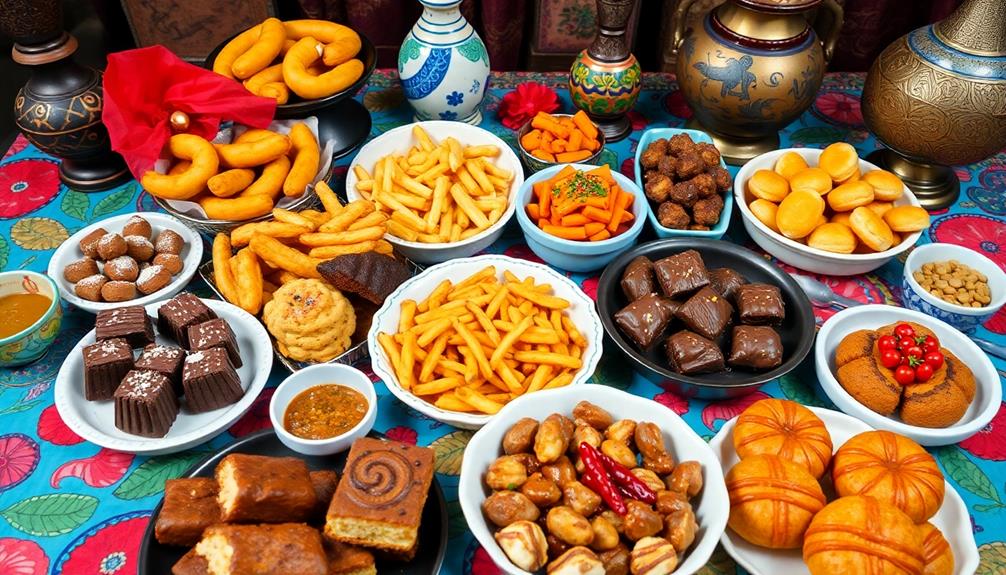
Diet culture permeates our society, creating a landscape where food choices are often tied to moral judgments. This association leads you to perceive indulgent foods as "bad," fostering guilt when you indulge in what are labeled as guilty pleasures. By framing certain foods as off-limits, diet culture not only increases their desirability but also contributes to unhealthy relationships with food.
| Diet Culture Impact | Effects on Individuals |
|---|---|
| Moral Judgments | Guilt and Shame |
| Restrictive Eating | Binge Eating |
| Emphasis on Indulgence | Anxiety Around Food |
Terms like "cheat meals" reinforce the idea that enjoying food is a moral failing, intensifying feelings of shame. These negative associations influence your self-identity and mental health, as you may feel pressured to adhere to strict eating rules. This pressure can lead to disordered eating habits, turning what should be enjoyable experiences into sources of anxiety. Ultimately, diet culture not only stigmatizes certain food preferences but also perpetuates a cycle of guilt and restriction, making guilty pleasures feel even more tantalizing.
Mindful Eating Practices
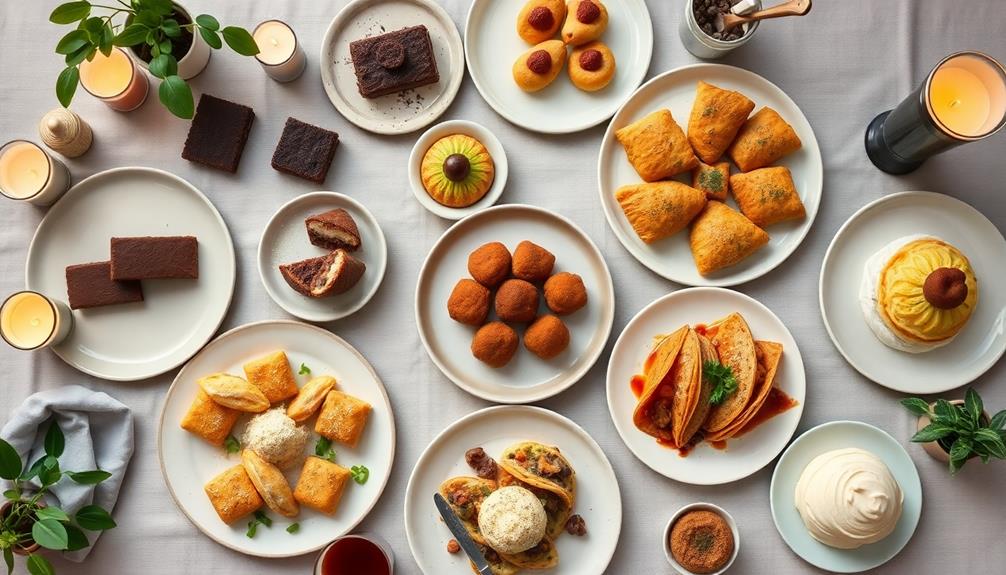
Mindful eating practices transform your relationship with food by encouraging you to immerse yourself in the sensory experience of each meal. By focusing on flavors, textures, and the feeling of satiety, you can enhance your overall enjoyment and satisfaction.
For instance, enjoying a dish like Nettle and Potato Soup can heighten your awareness of nourishing ingredients. When you practice mindful eating, you become more attuned to your body's hunger cues, helping to reduce overeating and emotional eating. This awareness allows you to address your emotional responses to food without judgment.
Embracing mindfulness in your meals counters the negative effects of diet culture, letting you enjoy a variety of foods without guilt or shame. Research shows that maintaining a mindful approach can lead to better mental health outcomes, greatly reducing stress and anxiety around food.
As you slow down and savor each bite, you foster a greater appreciation for your meals. Ultimately, mindful eating helps diminish the allure of "guilty pleasures," normalizing indulgence and making it easier to enjoy those foods without feeling bad about it.
Historical Perspectives on Food
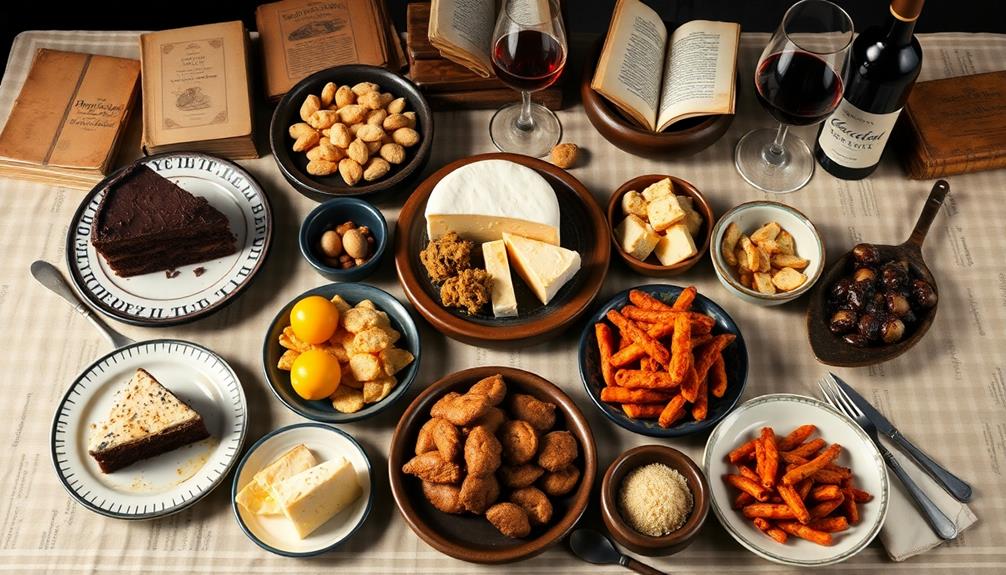
Throughout history, food has been more than just sustenance; it's been intertwined with culture, morality, and identity. The term "guilty pleasure" first appeared in the 1860s but became prominent in the 1920s, reflecting a societal shift toward viewing indulgent foods as both enjoyable and shameful.
This notion of indulgence is particularly relevant during celebratory occasions, such as Halloween, when people often indulge in creative Halloween treats that evoke both joy and a sense of guilt for overindulgence. The Industrial Revolution contributed to more sedentary lifestyles, and with evolving beauty standards, people began to perceive certain foods as sinful.
This moral failing associated with gluttony has greatly shaped modern food culture, creating a complex relationship between pleasure and guilt. As you navigate food choices today, you might notice how historical attitudes linger, influencing your perceptions of indulgence.
Terms like "sinful" treat illustrate how our culture often attaches guilt to enjoyment. The flapper culture of the 1920s reinforced specific beauty ideals, further stigmatizing indulgent eating.
This ongoing struggle with food-related guilt isn't just a personal issue; it's a collective experience that spans generations. Understanding these historical perspectives can help you recognize the roots of your feelings about food, allowing for a more nuanced approach to what you enjoy eating without the weight of guilt.
Redefining Food Enjoyment
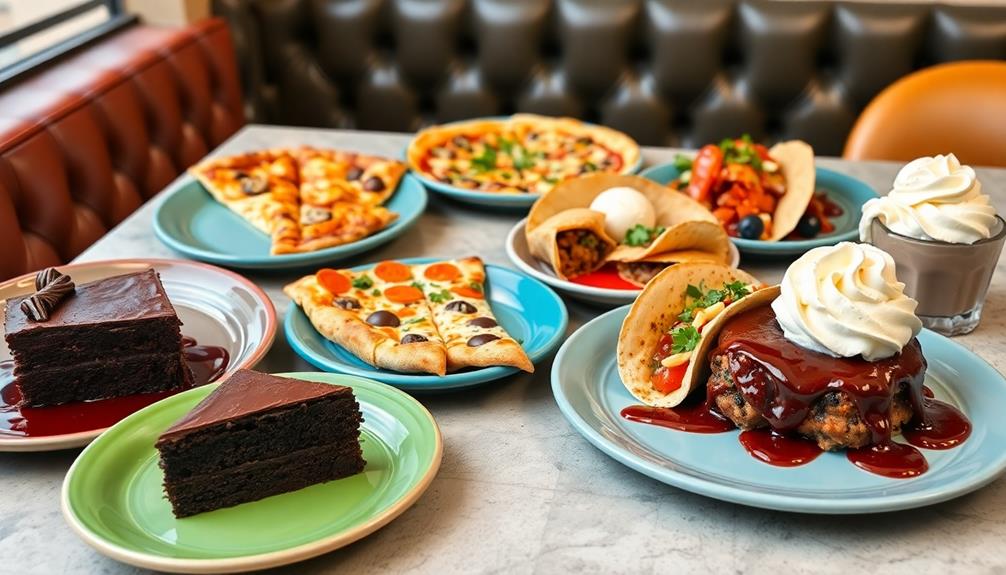
As you dig into the concept of food enjoyment, it's essential to shift away from the stigma attached to indulgent eating. The term "guilty pleasure" suggests a negative connotation, implying that enjoying certain foods is morally wrong.
For instance, dishes like Red-Braised Pork Belly showcase how indulgent flavors can be celebrated rather than shunned. By redefining food enjoyment, you can begin to view all foods neutrally, free from labels like "good" or "bad." This change fosters a healthier relationship with food, allowing you to savor each bite without guilt.
Research shows that when you view your food choices without judgment, you reduce emotional stress related to eating. Instead of labeling meals as "cheat meals," focus on moderation and variety.
This approach not only helps you enjoy your meals more but also leads to a more satisfying and balanced diet.
Frequently Asked Questions
What Is a Food Guilty Pleasure?
A food guilty pleasure is something you love to indulge in, even if you feel you shouldn't. It's that decadent dessert or greasy snack that brings you joy, despite the guilt it sometimes evokes.
Where Does Food Guilt Come From?
Food guilt often stems from societal norms and diet culture that label indulgent foods as 'bad.' You internalize these messages, leading to feelings of shame when enjoying certain treats, creating a cycle of restriction and bingeing.
What Is an Example of a Guilty Pleasure?
Imagine sinking your teeth into a warm, gooey slice of chocolate cake. That's a guilty pleasure! You can't resist its rich flavor, even knowing it's not the healthiest choice, and that's perfectly okay.
How Does Guilt Affect Food Choices?
Guilt can distort your food choices, making you crave what you think you shouldn't have. You might indulge, then feel shame, leading to a cycle of bingeing and restriction that harms your well-being.
Conclusion
In every culture, guilty pleasures reveal our shared love for indulgence, our desire for comfort, and our need for connection. They remind us that food isn't just fuel; it's a source of joy, nostalgia, and even rebellion. By embracing these delights, we can challenge the constraints of diet culture, savor the moment, and redefine what food enjoyment truly means. So, go ahead—celebrate your guilty pleasures, relish in your cravings, and indulge in the flavors that make life delicious.
